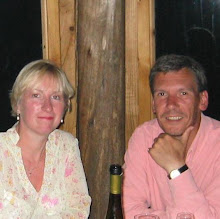Labour, the centre left party of incumbent prime minister Gordon Brown, has lost its overall majority. The centre right Conservative ("Tory") Party of David Cameron (small mouth man) has the most seats but not an overall majority. The centre-centre Liberal Democrats, who are always third, had a disappointing night losing 5 seats despite the "Clegg Effect" of their short-eyebrowed leader's stellar performance in the opening leaders' debate.
Although common and/or the norm in many European countries (notably Germany) a "hung parliament" with no party having an overall majority is rare in Britain, the last one having been in 1974.
As well as the Big 3, there are what I call "the Bits and Pieces" - a rag bag of 28 Irish, Scottish and Welsh nationalists, Irish Unionists, an Irish neither Unionist nor Nationalist, an Irish Independent (Ireland never votes for the Big 3) and one Green (a novelty in the British parliament).
Now do the arithmetic. A majority is 326 seats. Tory + Lib Dem = 361. Labour + LD = 315. To build a majority, Labour needs to get not only the LD's on side but 11 of the Bits and Pieces as well.
Clegg is the King Maker but you have to understand that a central plank of Lib Dem policy is electoral reform to remove the situation whereby, under the British voting system, the LDs score 23% of the vote but only 9% of the seats in Parliament. Labour and Conservative, of course, are reluctant to give up their in-built advantage but Labour have recently had a bit of deathbed conversion to electoral reform - cynics believe this is because they predicted losing their majority and wanted to have something to be able to attract the LDs on board. The Tories remain wedded to the present system.
Clegg said he would speak first to the party with the most seats. The Tories and the Lib Dems are unlikely bedfellows but is an alliance between the second and third placed parties (plus some of the Bits and Pieces) to shut the first placed party out of power credible? The political pundits are saying the most likely outcome will be a Conservative minority government (as there is in Canada, Portugal and Scotland to name but three: it means the government has to try and rule by consensus).
Where we are just now (Friday night, day after the election) is that the Tories and LDs are closeted in talks. Brown, meanwhile, remains the Prime Minister. Only if/when the Tories and LDs succeed in forging an alliance will Brown have ceased to "command the confidence of a majority in Parliament", as the sonorous phrase has it, and have to go Buckingham Palace and tender his resignation to the Queen.
And if (when?) the Tories and LD's don't form an alliance? Well Brown announced outside No. 10 Downing Street (office and official residence of the PM in London) this afternoon that he is open to talks with Clegg and promising an early referendum on electoral reform. This would be a huge prize for the LDs but dare they be associated in a "grubby backroom deal" with a party which has lost its mandate?
And what of the Bits and Pieces? If you can't scrape enough of them together, it'd be a minority government of the 2nd and 3rd placed parties instead of a minority government of the winning party - is that credible? Horrid little Salmon of the Scot Nats (6 seats) has said no to any deals with Tory or Labour but you're probably better off without his sort anyway. You'd be permanently looking over your shoulder, getting in to bed with that sort of crowd of gnats, taffs and bogtrotters. At least you know where you stand with Sinn Feinn (ultra Irish Nationalist) - they never take their 5 seats in Parliament because it involves swearing an oath of allegiance to the Crown which is anathema to Fenians.
And on the subject of the Crown, she was at Windsor Castle today but apparently her private secretary has taken up almost permanent residence at No 10 so as to be aware of what's going on and report back. If none of the Big 3 parties can do a deal with each other, then it will be her decision who is asked to form the next government: the job is more than just hosting garden parties and trooping the colour.
She would almost certainly appoint Cameron as leader of the biggest party. That's what she did at the last hung parliament in 1974 when the Tories under Edward Heath lost their majority and couldn't form an alliance with the Liberal Party (as they were called then). She appointed the leader of the largest party, Harold Wilson of Labour, as Prime Minister of a minority government. There was another election 8 months later (when Labour won a majority albeit a slim one) so don't assume the next British general election will be 5 years hence.
Fascinating stuff.
Is it just me, or does Clegg's hair look the brush on one of these shoe cleaning machines you see at airports?










3 comments:
And I thought the US's blue state-red state geo-political divide was pronounced!
"UK could face another election within year":
http://www.reuters.com/article/idUSTRE6471Lhttp://www.reuters.com/article/idUSTRE6471LH20100508H20100508
If pundits are to be believed, it could be as soon as this Autumn. Oooh, I bet you can hardly wait to go through all this again!
Kathie. The blue-red thing - as I'm sure you know - is a reflection of the fact the Tories (blue) and the Lib Dems (orange) tend to do well in large rural constituencies whereas Labour (red) tend to do well in smaller (in terms of area but densely populated) industrial urban constituencies.
As for another election soon, what the pundits are also saying is that, whoever the next government is, it will have to take some tough (electorally unpopular) decisions to reduce the deficit. So they don't want another election too soon.
Labour might do well to "sit this one out", then sweep back to power under a new leader in a couple of years' time, brushing aside the Tories tarnished as the party of the cuts ...
SNP please take note.
Post a Comment